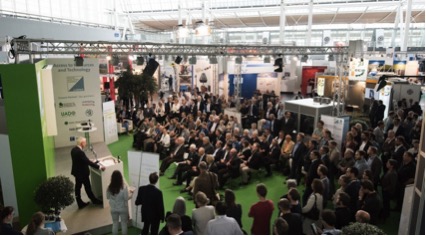GERMANY – LIGNA, which will next be held from 27 to 31 May 2019, in Hannover, has for many years featured a Scientific Research and Education showcase.

Among the institutions on the LIGNA.Campus will be Salzburg University of Applied Sciences (FH Salzburg), Kuchl Campus. At its display at Stand E62 in Hall 11, it will be presenting its “Hybrid Materials” technology and research platform. Hybrid materials are a class of highly promising new composites. They are engineered to have particular properties, which, in conjunction with new processing technologies, open up exciting new applications. An example of this is the “Biogenic Filaments for 3D Printing” project, which the university will be profiling in Hall 11.
The Rottenburg University of Applied Forest Sciences (HS Rottenburg) showcase (Stand F75, Hall 11) will feature a newly developed type of cross-laminated construction timber made from hardwoods. The university realized this successful project in cooperation with research and industry partners.
At Stand F69 in Hall 11, Eberswalde University for Sustainable Development (HNE Eberswalde) will present a new method for continuously monitoring the structural integrity of timber structures using electrically conductive adhesives. The university’s research in this area is subsidized via Germany’s Agency for Renewable Resources (FNR) as part of the “Renewable Resources” development program run by Germany’s Federal Ministry of Food and Agriculture (BMEL). The researchers have already successfully lab-tested special adhesives that are filled with electrically conductive particles and which thus support integrated sensors for monitoring expansion, temperature and moisture. The researchers’ focus is on safety in the use of sustainable wood materials. Timber structures in public and semi-public areas (bridges, exhibition halls, train sheds, silos, warehouses, etc.) are prone to change over time and therefore present a higher risk of hazard than structures made of other materials.
The Ostwestfalen-Lippe University of Applied Sciences (HS-OWL) showcase is at Stand F67 in Hall 11 and features research findings and technology transfer milestones. The showcase will profile several areas of R&D endeavor, including determination of the properties and design values of oil palm wood, development and testing of products made from oil palm wood, lightweight construction, joining technology and technology integration in industrial and SME-scale furniture production and interior finishing, production excellence, and optimization of production processes in the wood, furniture and woodworking machinery industries.
At the Rosenheim University of Applied Sciences (TH Rosenheim) display at Stand D88 in Hall 11, the focus will be on today’s ever-changing and integrated production environments. Digitization and steadily increasing customer expectations in terms of product individualization necessitate flexibility and agility on the part of manufacturers. In TH Rosenheim’s research projects, humans, machines, logistics processes and products all communicate and collaborate with each other in a direct, decentralized fashion. The aim of the projects is to decentralize traditional management structures and reporting lines while ensuring the optimal, seamless integration of all parts of the value chain, starting with the initial product idea and continuing through development, production and use, right the way through to maintenance.
The University of Kassel will be presenting its TETHOK (Textile Tectonics for Timber Construction) project at stand F66 in Hall 11. The project team is developing a continuous “thread” made of solid wood, which can be used to create technical textiles and thus promises a range of completely new applications and design possibilities. TETHOK combines the excellent ecological performance, aesthetics and natural lightweight properties of solid wood with the benefits of textile structures. Textiles have many advantages: excellent suitability for lightweight construction, versatility of form and function, highly developed and proven manufacturing and processing technologies, and a characteristic, ever-changing yet deeply familiar aesthetic of parallel and crossing threads.
At its showcase at Stand E67 in Hall 11, the Baden-Württemberg Forestry Testing and Research Institute will present an overview of its current hardwood research initiatives. The showcase will feature novel approaches to determining the raw-materials potential of new hardwood species by assessing trees while they are still in the ground; the results of research into the use of new technologies for roundwood assessment, sorting and grading; and research on new ways of utilizing hardwoods.
At Stand E69, the VDMA Woodworking Machinery Research and Testing Association (FPH) will explain the work it does as a champion of pre-competitive research in the wood industry. FPH is a body in which industry leaders work closely with the research community to help shape the future of woodworking. One of FPH’s particular concerns is to promote the development of the next generation of scientists. The association serves as a forum where wood industry SMEs can contribute to an extensive range of research programs in partnership with the big players in the industry.


0 Comments